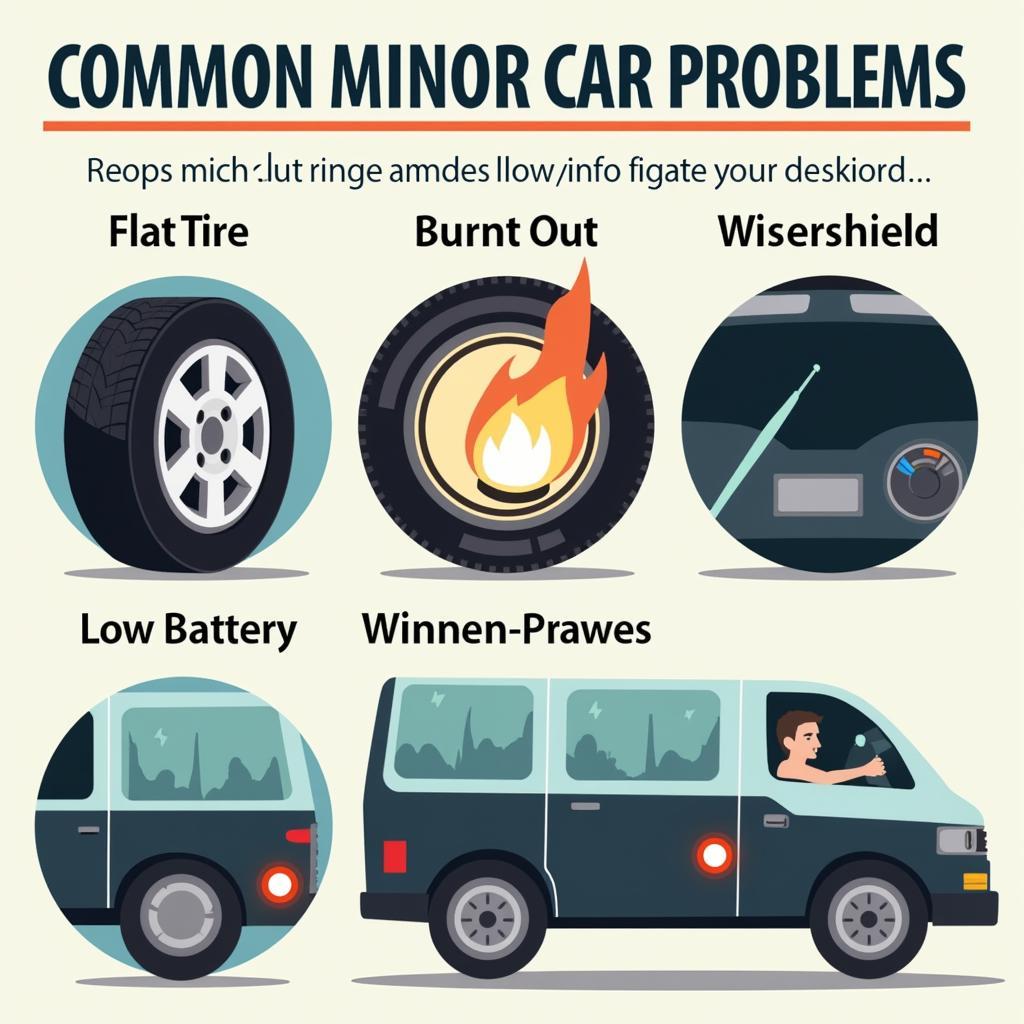Minor Car Problems can be a real headache, but they don’t always require a trip to the mechanic. Understanding how to diagnose and address these issues can save you time and money. This guide provides practical advice for car owners, repair shop owners, and technicians on handling common minor car problems effectively.
 Common Minor Car Issues
Common Minor Car Issues
Identifying Common Minor Car Problems
Many car issues seem daunting, but they often stem from simple, easily identifiable problems. Recognizing these early can prevent them from escalating into major, costly repairs. Some common culprits include flickering lights, unusual noises, fluid leaks, and decreased performance. Paying attention to your car’s behavior is the first step in tackling minor car problems. For instance, a squealing sound when you brake can indicate worn brake pads, a relatively easy fix.
Don’t underestimate the power of regular checks. Simple inspections, like checking your tire pressure and fluid levels, can prevent many minor car problems from occurring in the first place.
problems with life like slot cars
Why are unusual noises from my car concerning?
Unusual noises coming from your car are often the first sign of a developing problem. These sounds, whether squealing, grinding, or knocking, can indicate issues with brakes, suspension, or the engine. Addressing these noises promptly can prevent further damage and ensure your safety on the road.
Diagnosing Minor Car Problems: A Step-by-Step Approach
- Listen Carefully: Pay attention to the specific sounds your car is making. Is it a grinding noise? A knocking sound? Where is the sound coming from?
- Check Your Dashboard: Warning lights are your car’s way of telling you something is wrong. Don’t ignore them!
- Inspect Fluids: Regularly check your oil, coolant, brake fluid, and power steering fluid levels. Low levels can indicate leaks or other issues.
- Smell for Anything Unusual: A burning smell can indicate an electrical problem or overheating. A sweet smell might mean a coolant leak.
How can I tell if my car battery is dying?
Dim headlights, slow engine cranking, and flickering interior lights can all signal a dying battery. Regularly checking your battery terminals for corrosion can help prolong its lifespan.
Simple Fixes for Minor Car Problems
Many minor car problems can be solved with some basic DIY skills and a few tools. Replacing a burnt-out headlight, changing a flat tire, or jump-starting a dead battery are all tasks that most car owners can handle themselves.
“Regular maintenance is key to preventing many minor car problems,” says automotive expert, Robert Hernandez, “Taking the time to check fluids, tire pressure, and lights can save you headaches down the road.”
problems with life like slot cars
When should I seek professional help for minor car problems?
If you’re unsure about the cause of a problem, or if you don’t have the tools or experience to fix it yourself, it’s always best to consult a qualified mechanic. Attempting to fix something beyond your skill level could lead to further damage and higher repair costs.
“Don’t be afraid to ask for help,” advises Sarah Chen, a seasoned mechanic. “A good mechanic will be able to quickly diagnose and fix the problem, saving you time and money in the long run.”
Conclusion
Tackling minor car problems doesn’t have to be intimidating. By staying proactive with regular maintenance, understanding basic diagnostics, and knowing when to seek professional help, you can keep your car running smoothly and avoid costly repairs. Remember, addressing minor car problems promptly can prevent them from becoming major headaches. For further assistance or expert advice, please don’t hesitate to contact us at AutoTipPro. Call us at +1 (641) 206-8880 or visit our office at 500 N St Mary’s St, San Antonio, TX 78205, United States. We are always here to help.




Leave a Reply